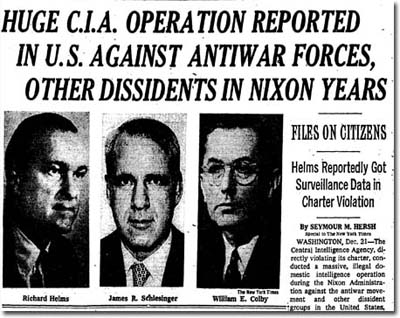Documents: CIA tapped, tailed newsmen - USATODAY.com
Documents: CIA tapped, tailed newsmen - USATODAY.com
Documents: CIA tapped, tailed newsmen
By Jennifer C. Kerr, Associated Press Writer
WASHINGTON — Little-known documents made public Thursday detail illegal and scandalous activities by the CIA more than 30 years ago — wiretappings of journalists, kidnappings, warrantless searches and more.
The documents provide a glimpse of nearly 700 pages of materials that the agency has declassified and plans to release next week.
A six-page summary memo declassified in 2000 and released by The National Security Archive at George Washington University outlines 18 activities by the CIA that "presented legal questions" and were discussed with President Ford in 1975.
Among them:
•The "two-year physical confinement" in the mid-1960s of a Soviet defector.
•CIA wiretapping in 1963 of two columnists, Robert Allen and Paul Scott, following a newspaper column in which national security information was disclosed. The wiretapping revealed calls from 12 senators and six congressmen but did not indicate the source of the leak.
•The "personal surveillances" in 1972 of Pulitzer Prize-winning muckraking columnist Jack Anderson and staff members including Les Whitten and Britt Hume. The surveillance involved watching the targets but no wiretapping. The memo said it followed a series of "tilt toward Pakistan" stories by Anderson.
•The personal surveillance of Washington Post reporter Mike Getler over three months beginning in late 1971. No specific stories are mentioned in the memo.
Much of the decades-old activities have been known for years. But Tom Blanton, head of the National Security Archive, said the 1975 summary memo prepared by Justice Department lawyers had never been publicly released. It sheds light on meetings in the top echelon of government that were little known by the public, he said.
CIA Director Michael Hayden called the documents being released next week unflattering, but he added that "it is CIA's history."
"The documents provide a glimpse of a very different time and a very different agency," Hayden told a conference of historians on Thursday.
Blanton pointed to more recent concerns, such as post-Sept. 11 programs that included warrantless wiretapping. "The resonance with today's controversies is just uncanny," he said.
The documents were compiled at the direction of CIA director James Schlesinger in 1973. In the wake of the Watergate scandal, he directed senior CIA officials to report immediately on any current or past agency matters that might fall outside the authority of the agency.
Copyright 2007 The Associated Press. All rights reserved. This material may not be published, broadcast, rewritten or redistributed.













